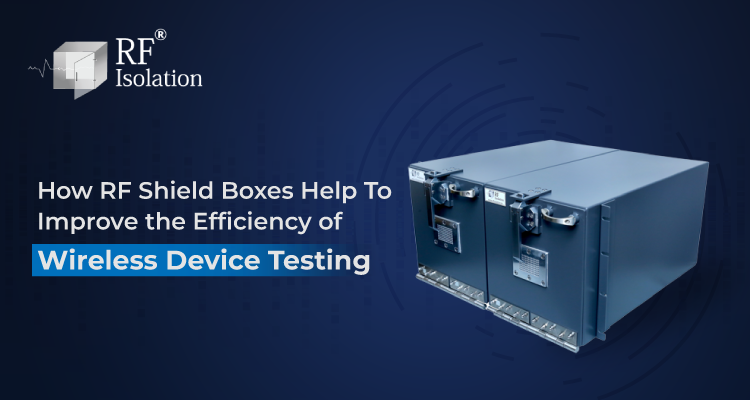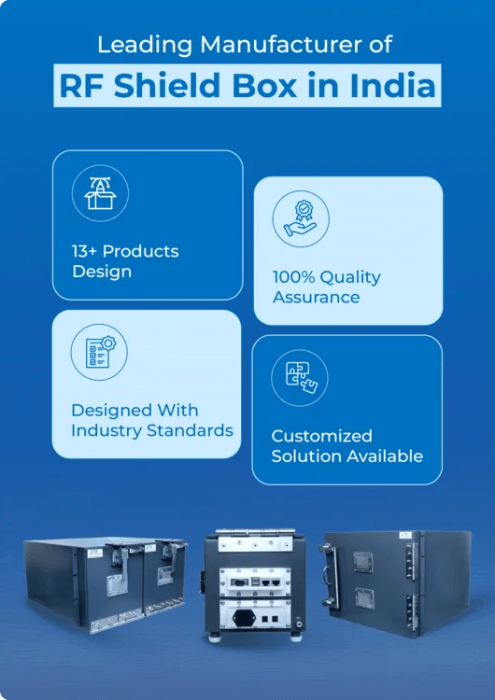
How RF Shield Boxes Help to Improve the Efficiency of Wireless Device Testing
Introduction: The Challenge of Wireless Testing
In today’s digital world, wireless devices surround us everywhere. From smartphones to IoT sensors, these devices require thorough testing before reaching consumers. But how do engineers provide accurate test results in environments filled with electromagnetic interference?
This is where RF shield boxes make all the difference. These specialized enclosures create the controlled testing environments necessary for precise, repeatable, and efficient wireless device testing.
What Are RF Shield Boxes?
RF shield boxes are specialized enclosures designed to block electromagnetic interference (EMI) from entering or exiting the testing environment. These boxes create an isolated space where wireless devices can be tested without external signal damage.
At RF Isolation, we manufacture various types of RF shielding solutions including:
- Standalone RF Shield Boxes: Complete isolation units for larger testing needs
- Desktop RF Shield Boxes: Compact solutions for laboratory environments
- Rack Mount RF Shield Boxes: Integration with existing test equipment setups
- RF Shield Boxes for 5G Device Testing: Specialized for next-generation wireless technology
Each box is constructed with conductive materials that effectively block radio frequencies across different wave ranges, guaranteeing your testing occurs in a controlled environment.
Why RF Shield Boxes Are Important for Modern Wireless Testing?
1. Avoiding Environmental Interference
Why do random factors sometimes affect your wireless test results? Environmental RF noise from nearby devices, cellular towers, and other equipment can damage test data.
RF shield boxes create a consistent testing environment by blocking external signals that might otherwise lead to inaccurate results. This isolation guarantees that your test data reflects only the performance of the device being tested.
2. Improving Test Repeatability
Have you ever struggled to replicate test results? Inconsistent testing environments are often the issue.
Our RF shield boxes provide:
| Benefit | Impact on Testing |
|---|---|
| Signal Isolation | Prevents external signals from affecting results |
| Controlled Environment | Creates consistent test conditions |
| Electromagnetic Shielding | Reduces noise floor for more sensitive measurements |
| Standardized Testing Space | Ensures tests can be repeated with the same parameters |
This consistency is crucial for quality control, regulatory compliance, and product development cycles.
3. Improved Testing Timelines
How much time does your team waste on test retakes due to interference? RF shield boxes dramatically reduce the need for retesting by guaranteeing clean results the first time.
By using properly isolated testing environments, development teams can:
- Complete testing phases faster
- Reduce costly retesting cycles
- Increase time-to-market for new products
- Focus engineering resources on actual product improvements
Key Features of Effective RF Shield Boxes
1. Shielding Effectiveness
What makes one RF shield box better than another? Shielding effectiveness is the primary measure of quality, indicating how well the enclosure blocks electromagnetic signals across different frequencies.
Our RF shield boxes at RF Isolation provide high interference levels across a broad geographical range, with particular attention to frequencies used in modern wireless communications (from 2.4GHz WiFi to 5G mmWave).
2. Accessibility and Usability
How easily can technicians access the device under test? The best RF shield boxes balance isolation with accessibility.
Our solutions feature:
- Quick-access doors with proper RF gaskets
- Multiple I/O feed through options
- Ventilation options that maintain RF integrity
- Ergonomic designs for comfortable testing procedures
3. Customization Options
Every testing scenario has unique requirements. Can your current RF shield box adapt to different testing needs?
RF Isolation specializes in customizable solutions, offering:
- Various sizes to accommodate different devices
- Customized I/O panel configurations
- Integration with test automation systems
- Specialized fixtures for specific device types
Applications Across Industries
1. Telecommunications Testing
How do telecom companies guarantee their new devices meet stringent performance standards? RF shield boxes are essential for testing devices across multiple network technologies.
Our solutions support testing for:
- 5G NR devices across all bands
- 4G LTE advanced technologies
- MIMO antenna configurations
- Bluetooth and WiFi connectivity
2. IoT Device Development
Why do IoT devices require careful RF testing? These devices often operate in crowded spectrum environments and must maintain reliable connections despite interference.
RF shield boxes help IoT developers:
- Validate wireless performance
- Test battery life under realistic RF conditions
- Ensure regulatory compliance
- Verify cooperation with other wireless technologies
3. Automotive Electronics
Modern vehicles contain dozens of wireless systems. How do manufacturers make sure they all work together without interference?
Our RF testing solutions help automotive engineers:
- Test in-vehicle entertainment systems
- Validate keyless entry systems
- Enhance GPS and navigation reliability
- Verify V2X (Vehicle-to-Everything) communications
4. Research and Development
R&D labs need flexible, reliable testing environments. How do researchers validate new wireless technologies efficiently?
RF Isolation’s shield boxes provide:
- Controlled environments for precise measurements
- Repeatable test conditions for scientific validation
- Adaptable setups for experimental configurations
- Protection for sensitive measuring equipment
How to Choose the Right RF Shield Box?
1. Measuring Your Testing Requirements
What wireless technologies will you be testing? Different applications require different levels of shielding effectiveness and frequency coverage.
Consider these factors:
- Frequency range of devices under test
- Physical size of test subjects
- Required noise levels
- Testing automation needs
2. Important Specifications to Consider
When selecting an RF shield box, which specifications matter most?
| Specification | Why It Matters |
|---|---|
| Frequency Range | Ensures coverage of your specific test frequencies |
| Attenuation | Higher values provide better isolation |
| Size | Must accommodate your devices comfortably |
| I/O Options | Should support all required connections |
| Ventilation | Prevents overheating during extended tests |
3. Cost vs. Performance Considerations
How do you balance budget constraints with testing requirements? While high-end RF chambers provide excellent performance, desktop and rack-mount solutions often offer sufficient isolation for many applications at lower price points.
Our experts at RF Isolation can help you find the right balance between performance and investment for your specific testing needs.
Integration with Test Equipment
1. Creating Complete Test Environments
How do RF shield boxes fit into your broader test setup? The best RF shielding solutions integrate smoothly with other test equipment.
Our shield boxes are designed to work with:
- Vector network analyzers
- Spectrum analyzers
- Signal generators
- Automated test systems
2. Automation Compatibility
Can your testing process be automated? Modern RF shield boxes support automation through standardized interfaces and remote-control capabilities.
RF Isolation’s solutions offer:
- Remote control options
- Standardized connections
- Software integration capabilities
- Compatibility with test sequence automation
Maintaining RF Shield Box Performance
1. Regular Verification
How can you know that your RF shield box maintains its performance over time? Regular verification testing is essential.
We recommend:
- Scheduled noise testing
- Inspection of RF gaskets and seals
- Verification of I/O connector integrity
- Standardization of integrated test fixtures
2. Common Maintenance Requirements
What maintenance keeps your RF shield box working properly? Simple preventative care extends the life of your testing equipment.
Key maintenance practices include:
- Cleaning RF gaskets
- Inspecting door mechanisms
- Verifying ground connections
- Replacing worn components promptly
Conclusion: Investing in Testing Efficiency
In the fast-paced world of wireless device development, efficient testing processes make the difference between market leaders and followers. RF shield boxes from RF Isolation provide the controlled testing environment necessary for accurate, repeatable results.
By investing in quality RF shielding solutions, manufacturers can:
- Reduce development cycles
- Ensure product quality
- Meet regulatory requirements consistently
- Build consumer confidence in their wireless products
Want to learn more about how our RF shielding solutions can improve your testing efficiency? Contact RF Isolation today to discuss your specific requirements and find our range of customizable RF shield boxes, chambers, and test racks.

